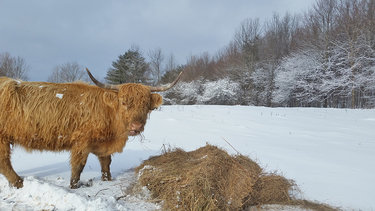Cornucopia of resources makes careers in farming ripe for the taking
HILLTOWNS — When it comes to support for new farmers, abundance is not an issue.
In fact, the problem might be figuring out how to make the people who would benefit from these programs aware that they exist in the first place.
For instance, New York State will forgive up to $50,000 of student loans for young farmers with a state-school degree who are willing to spend five years operating a farm, effectively freeing up a good amount of their early capital.
It’s one of several programs mentioned by Gary Kleppel, a Knox farmer, professor emeritus, and chairman of the town’s agricultural committee, who spoke with The Enterprise this week about the resources available to farmers who are trying to establish themselves.
“One of the things we find most difficult is communication …,” Kleppel said. “I think there are lots of resources out there. There are loans and grants through the Farm Service Agency, which is federal. As I said, there’s the debt forgiveness program, which is a state program through the New York State Department of Education. There are committees like ours, which will help a young farmer become established.”
Just this past month, the New York State Department of Agriculture and Markets held two informational sessions about $4.3 million in funding available to new and disadvantaged farmers.
About $850,000 is to be disbursed through competitive grant programs to new farmers (that is, those who have been farming for less than 10 years), who can receive anywhere between $5,000 and $250,000 in award money, so long as they can match the amount. The remaining $3.4 million is to go to economically or socially disadvantaged people who are either established farmers or who are hoping to start a farm but face hardship.
It’s just one slice of the total support available through the state, which provides dozens and dozens of links to different channels and organizations, including private ones, such as the Northeast Beginning Farmers Project and the National Young Farmers Coalition.
The Young Farmers Coalition has an especially easy-to-use guide that breaks down the types of loans available to farmers (everything from conservation loans to youth loans to operating loans and so on), along with insurance information and direct advice from farmers on how to navigate a complicated system.
Some support isn’t financial but educational, such as that offered by Cornell Cooperative Extension. Agricultural educators at the extension “can assist someone in learning more about producing just about any crop that can be successfully grown in our area,” according to Beginning Farmer and Market Development Coordinator Stephen Hadcock. Also, online courses cover other topics.
Interest in farming has flourished since the start of the COVID-19 pandemic.
In 2020, Hadcock had told The Enterprise, “My opinion would be that, regardless of age, there’s been a renewed sense of some sort of desire or passion to connect with the land once again. Some of the people that I’ve talked to who have started farms see it almost as a life’s mission that they want to provide good, healthy food for their community.”
He said this week that that interest has remained even as life has more or less returned to normal.
Kleppel said that, from his own experience, “that’s absolutely right,” and suggested that, in addition to the pandemic putting into people’s minds the idea of food security or isolation reconnecting them to their land, farming lines up with the lifestyle values associated with Gen Z: People born from the mid-1990s through the early 2010s who are the first to grow up with the internet and all the social networking that came with it.
That group, generally speaking, has a tendency to look at issues in a big-picture context, which results in them favoring jobs and lifestyles (and not necessarily in that order) that supply a sense of purpose, as opposed to being conscientious or ambitious because of traditional social pressures, according to a summary of the generation’s labor views by Vox.
They “realize that work isn’t the only thing you’re doing in your life,” Kleppel said.
According to the Young Farmers Coalition, young farmers in 2022 were especially motivated by social and environmental justice, with 83 percent of survey respondents stating that “one of their farm’s primary purposes for existing is engaging in conservation or regeneration,” and nearly 30 percent of all farmers stating that they work to improve the lives of people of color. Virtually all young farmers engage in sustainable practices,the survey found.
Transition
So, with young people being more interested in farming, and also being more likely to be first-time farmers, as opposed to coming from an agricultural background, according to the coalition, Kleppel and his committee are working to get them the land they need by connecting them with older farmers on the verge of retirement.
Acquiring farmland is one of the top challenges faced by new farmers, and, according to Civil Eats, new farmers and farmers of color are frequently outbid by their more experienced competitors as land gets more expensive, especially in the Hudson Valley, where The New York Times writes about a disconnect between what landowners think farming should be and what farmers who seek rental agreements actually need.
For a farmer, figuring out what to do with a farm they’ve spent their life developing can be a bit like writing a will, creating a certain amount of anxiety that can become a barrier to a meaningful transition.
“The big thing you see when you say ‘farm transition’ to an older person who’s been on the land for 50 years is fear in their eyes,” Kleppel said. “Many people just don’t know what to do to transition their farm — the most important thing they’ve [worked on] their entire lives. Farmers are very, very attached to their land.”
But, he said, they tend to want to see it continue as a farm, making the networking and planning the committee helps them with a valuable resource.
Kleppel said that he and his wife are themselves in the middle of figuring out a transition since their kids aren’t interested in taking up farming.
“We’re working with attorneys, financial advisors, and planners, particularly those who have experience with elder care, elder processes, and retirement,” he said. “And we’re also working with groups like the Local Farms Fund which will buy the property for a young farmer and then create a leaseback system that over five years allows the young farmer to take over the loan.”
The organization Farmland for A New Generation runs a site for New York farmers that also connects them with people seeking land.
Helping farms stay in the hands of farmers also helps prevent that land from being developed residentially, he said, and more farms can only be good for rural communities like Knox.
“I think the town of Knox, in particular, understands that agriculture sits at the junction of business and economic development, and conservation, and open space, and rural character, which citizens in our town really appreciate and want,” Kleppel said.



